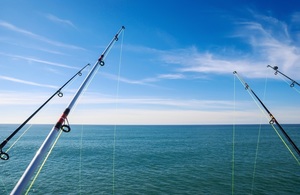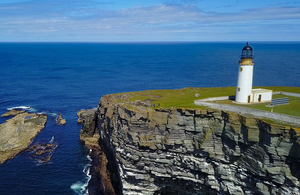MMO engages recreational fishers on Fisheries Management Plan.
News story
Details of MMO engagement on the development of the Channel demersal Non-quota species Fisheries Management Plan (FMP) with recreational anglers.

Fishing rods and lines over an open sea.
The Marine Management Organisation (MMO) joined a forum hosted by the Angling Trust in July to discuss development of the Channel demersal Non-quota species Fisheries Management Plan (FMP) with recreational anglers.
MMO is engaging with a wide range of marine stakeholders in the first phase of its development of the FMP for key non-quota demersal stocks, and recognises the importance of including views from the recreational fishing sector for consideration alongside those of commercial fishermen.
FMPs are central to the Government’s approach to fisheries management now the UK has left the EU’s Common Fisheries Policy and are geared to ensuring fish stocks are fished sustainably and the marine environment is protected.
The Channel demersal NQS FMP will cover ICES divisions 7d and 7e and will cover a wide range of demersal species.
Development of a plan specifically for demersal non-quota species in the Channel was highlighted by the fishing industry and other key marine stakeholders as a necessary move because of concern about potential over-exploitation of some stocks and a lack of data about non-quota stocks in general.
Richard Hoskin, Head of Fisheries & Marine Conservation at MMO, said:
We’d like to thank the Angling Trust and their members for making time to gives us their views.
Alongside all the stakeholders we are currently engaging with, the views of the recreational fishing sector provide us with a much broader understanding of what the plan should cover and the impact it could have.
MMO has published a more detailed overview of the feedback it received from the forum and we encourage recreational fishers to keep on giving us their thoughts at fmp@marinemanagement.org.uk
Here are the highlights of the forum feedback:
MMO is planning a second series of engagement sessions with commercial and recreational sectors on the south coast this autumn to ensure as many stakeholders as possible have had a chance to express their views on the demersal NQS FMP.
Published 23 September 2022

